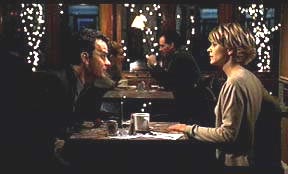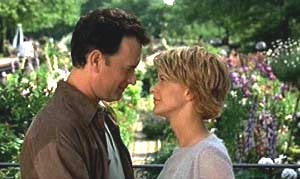Ellen and Jim Have a Blog, Too
We are two part-time academics. Ellen teaches in the English department and Jim in the IT program at George Mason University.


Screwball or romantic comedy: transpositions of Austen · 15 March 07
Dear Marianne,
I’ve seen two more film transpositions of an Austen novel into romantic comedy: Miramax Columbia Tristar 2001 Helen Fielding and Andrew Davies’s Bridget Jones Diary, starring Renee Zellweger, Hugh Grant, Colin Firth; with Gemma Jones, Jim Broadbent (based on the novel by Helen Fielding); and 1998 Warner Nora and Delia Ephron’s You’ve Got Mail, starring Tom Hanks and Meg Ryan, with Greg Kinnear, Jean Stapleton (based on a play by Miklos Laszlo). The text alluded to is Austen’s Pride and Prejudice.
One sees how film-makers view Austen (and how they assume audiences do) by looking at the characteristics these share with other transpositions: Whit Stillman’s 1990 Westerly Metropolitan, Victor Nunez’s 1993 Independent Ruby in Paradise, Amy Heckerling’s 1995 Paramount Clueless. These are all witty, and have much literary allusion beyond the references to Austen, specifically of books; they are all romantic comedies; they feature young people, mostly in their early 20s, trying to find a place in the world they fit, can be happy in, can endure. There’s a strong tendency to lightness of atmosphere even when hysteria and soul-breaking loss continually assail the heroine (or hero).
In all of these there are an overt reference to a number of books, and the hero (or heroine) proves his worth when he reads a novel by Austen: in Metropolitan Tom reads Persuasion; in Ruby in Paradise Ruby reads Northanger Abbey; in You’ve Got Mail Joe Fox (Tom Hanks) reads P&P, Kathleen’s (Meg Ryan) favorite novel which she’s read countless times. Joe and Kathleen are deeply involved with deeply emotional levels of themselves usually hidden from social life in their nightly email correspondence; they are anonymous to one another at the beginning of the film, though we the audience know they are continually meeting as business enemies and people whose personalities clash. As Bridget and Mr Darcy are replays of Elizabeth and Mr Darcy; so Kathleen (Meg Ryan) and Tom are replays of Elizabeth and Mr Darcy, with the parallels being much closer in the later situation: Kathleen thinks she must hate Joe for opening a discount bookstore near her small expensive one, a move which leads to hers going out of business.
You’ve Got Mail is also an update of The Shop Around the Corner (which I’ve not seen, and is also based on a play by Miklos Laszlo). Some of the shots in You’ve Got Mail seemed allusions to other literally faithful film adaptations of Austen. The final zoom away shot of them kissing in this large garden occurs repeatedly in the Austen films, but especially close is the 1996 BBC Emma); the hero and his father playing backgammon (Emma and her father do in the novel and BBC 1996 film; Elizabeth and her father several times in the 1979 P&P. Some themes: Joe sticks up for the importance of the personal. At first You’ve Got Mail seemed too artificial and bright, cliched, with the parallels too thin, but as I watched I grew to like it and was moved at the close and am now persuaded it has as much in it that alludes to Austen literally, thematically, structurally and through movie codes as one finds in all the recognized transpositions.
Just on the email angle: You’ve Got Mail taught the viewer to distrust email at the same time as showing another self can come forward to be met through email that does not show up in public life. The dream of a loving friend or companion on the "other" end (of the electronic connection for letters and notes, written talk) is acutely explored, the yearning for it. At one point on email Joe reassures Kathleen thus: "Meanwhile I’m still here. You can always talk to me." It’s how some people imagine God, no? Always there, on the ready, for you.
Genres matter, and we can see how film-makers want their films to be understood by looking at the stills they release for downloading. Bridget Jones Diary is screwball comedy, and it’s better than You’ve Got Mail because of this: funnier, more varied and intriguing, and paradoxically more thoughtful finally:
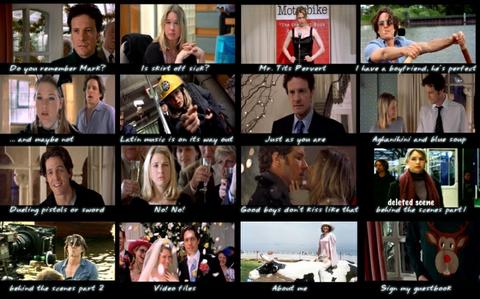
It has an undercurrent of intense sensitivity. The choice of Colin Firth to play Mark Darcy combines his recognition as Mr Darcy and his type as the sensitive hero (seen beautifully in the older film adaptation of J. L. Carr’s Month in the Country and more recently as Vermeer in the film adaptation of Tracy Chevalier’s The Girl With Pearl Earrings):
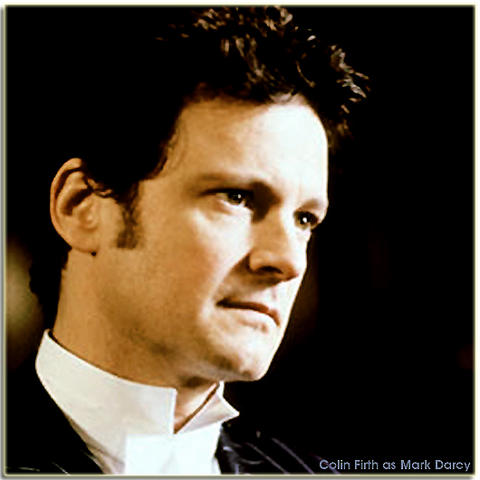
And one of meanness, of danger as seen in Hugh Grant as slippery cad (a role he has played on and off since he was the murderous & treacherous villain hero of a film adaptation of a Jacobean play, Middleton’s The Changeling):
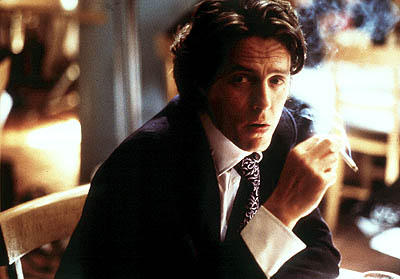
The stills released of You’ve Got Mail are all of hero and heroine, first meeting (we see them several times in bookstores and book parties), then quarreling, of which here is but one of many:
and finally doing the inevitable which of course leads to happiness: They are near kissing (as a still of Ciarhan Hinds as Wentworth and Amanda Root as Anne Elliot in the 1995 Persuasion:
No still released of her at the computer, and only one of him, very small:
The most interesting element in the film was their meeting and falling in love through emails. But that would subvert the strong tendency of people to believe in safety by staying in known groups.
Here’s just the transpositions I’ve watched thus far:
Transposition or analogies
1) Ruth Prawer Jhabvala’s 1980 Jane Austen in Manhattan (an early James Ivory and Ismail Merchant production);
2) Whit Stillman’s 1990 Westerly Metropolitan, no stars;
3) Victor Nunez’s 1993 Independent Ruby in Paradise, starring
Ashley Judd, Todd Field, Bentley Mitchum, Allison Dean, Dorothy Lyman;
4) Amy Heckerling’s 1995 Paramount Clueless, starring Alice Silverstone;
5) Nora and Delia Ephron’s 1998 Warner You’ve Got Mail, starring Tom Hanks and Meg Ryan, with Greg Kinnear, Jean Stapleton (also a remake of The Shop on the Corner, itself based on a play);
6) Helen Fielding and Andrew Davies’s 2001 Miramax Columbia Tristar Bridget Jones’ Diary, starring Renee Zellweger, Hugh Grant, Colin Firth; with Gemma Jones, Jim Broadbent.
Elinor
--
Posted by: Ellen
* * *
Comment
- From Kathy:
"Ellen, Ephron's When Harry Met Sally, which, for my money, is a better movie than You've Got Mail, could also be viewed as an "Austen" text. I strongly recommend this, Ellen.
On another note (predictable, I suppose): Whatever happened to Meg Ryan? She was in comedies for years, many by Ephron, and was very funny, rather sweet, perhaps too self-consicous, and now she’s over the 40 hump, and has vanish-ed? (Or is it because of her sordid affair with Russell Crowe, as ET would maintain.) Julia Roberts, edgier, drier, replaced her in American comedies: now SHE’S disappeared, a mother with twins.
Who’s the comic actress these days? Cameron Diaz? Renee Zellweger? I’m not quite sure. Nicole Kidman seemed to be in EVERY American film for a while, but she’s Australian so I’m not sure she counts as "America’s sweetheart."
Kathy"
— Elinor Mar 16, 8:16am # - Dear Kathy,
Thank you very much for the citation. I have a few criteria "Austen" adaptations have to meet: this one of You’ve Got Mail did meet them—including explicit allusions to Austen, to a book by her, and parallels between central characters’ relationships. Bridget Jones’ Diary had this too. Nothing to do with Austen—even if I will write "against" those who substitute the films for Austen and do not differentiate between them—I do like the films and watch them for themselves, so I want to say I preferred BJD to YGM. Why? BJD was wackier, the wit was more extravagant, the emotions more traumatized in a comic-wild way, and so I think it succeeded as a screwball comedy, while You’ve Got Mail remained romantic emotional comedy, with a pretense of realism.
I’ll try When Harry Met Sally. On my list now is also The Shop Around the Corner (the original movie upon which You’ve Got Mail is an modern variant), Sleepless in Seattle (that has Ryan and Hanks too), The Edge of Reason (a Bridget Jones movie you Kathy said connected to Persuasion).
I do like movies and enjoy melodrama, romantic comedy, witty comedy, historical costume drama, all of which can also be adaptations—and political realism too.
I feel the kinds of movies I like assuage loneliness.
The film-makers don’t allow women actresses to play young heroines past about 40. I’m thinking of betaking myself to Miss Potter which stars Zellweger (this weekend).
Earlier this week I rented and watched The Age of Innocence. I found it of great interest; unfortunately I’ve not read Wharton’s novel of this name so cannot draw meaning from comparison – or the process of adaptation as such. But I can link it to Tomalin’s Dora Jordan’s Profession: the film shows from the point of view of the supposedly suffering male a woman who is isolated and lives alone; the Countess had a brutal husband and she left him, but now she is not acceptable. He has promised to marry this other woman and goes through with it and then she gets pregnant. The great pity is for the male, and we are to applaud him for staying for of course his family are now all a succcess and his wife was ever so grateful all her life. The Countess Olenska is of course presented as having sufficient money so that she remains this lovely object. I watched it to see where the actress who played the Fanny Price part in Metropolitan was put: she was the petulant conventional sister of the long-suffering self-sacrificing hero. About par for the course of popular stereotypes.
E.M.
— Elinor Mar 16, 8:20am # - From Fran:
"’she’s Australian so I’m not sure she counts as "America's sweetheart.’
Actually, like Mel Gibson (NY), she born in the US (Honolulu, Hawai), but grew up Australia, so she presumably counts as a real American sweetheart, too.
I also think When Harry met Sally much the better film and script, with some very funny lines and scenes with Billy Crystal, but You’ve got Mail does grow on you after a while, as Ellen says. I think anyone would find it hard to top a James Stewart at the height of his career as he was in The Shop Around the Corner, though, even if it is Mr Hanks and I personally prefer the other films Stewart made at much the same time: Mr Smith goes to Washington, Destry Rides Again and The Philadelphia Story.
You mentioned Meg Ryan disappearing from the radar because of the scandal with Russell Crowe and that she’s beginning to show her age. I think another thing is her film public found it difficult to accept the switch in roles she attempted to get away from this blonde, sweetheart image younger people like Reese Witherspoon were beginning to supercede her in. This includes films like the thriller Proof of Life with Crowe or the earlier military film, Courage under Fire, which she was OK in, and the erotic thriller In the Cut, a novel and film we’ve talked about here before, where I thought she was seriously miscast – ditto that terrible boxing film, Against the Ropes.
It’s odd how divorce affected Kidman and Ryan in different ways: Kidman started to make really good films again once tossed by Cruise, whilst his own career started to go out of whack: Ryan’s career began to stutter, whilst her ex, Dennis Quaid, started his own renaissance.
It probably fits in with all this that I can never remember the name of the star who played well opposite Stewart in the shop film – it was Maureen Sullivan, whose own career was bombed by family problems, divorce and breakdowns a
nd ultimately ended in suicide.
Fran"
— Elinor Mar 16, 9:09am # - I didn’t know Maureen Sullavan committed suicide. She played Jane Bennet in the 1940 P&P: here we see the type casting, the strong conventionalized mother-image goes to Mrs Miniver, aka, Elizabeth Bennett (and Jennifer Ehle was made to look superwholesome), and the sweetheart to Sullivan.
In Austen's Pride and Prejudice Jane Bennett says she wants to look on the "good" side (be candid) not because she can’t see the other, she does; but because to look at the other without insisting the optimistic is also possible at least, is to distress her so she couldn’t carry on.
A different statement than innocent sweethearts makes. One that gives insight into Austen’s fiction.
I did get that Ryan was this thin blonde, basically asexual (small breasted), the little girl still playing with her mother, living up to her darling mother (another sweetheart), the children’s bookshop bit, and how she was "taught" by the man who conquered her in business. Insofar as I allowed myself to see this it just makes me feel ill. It’s a dream from upper class white people that Edith Wharton tried to shatter—and got nowhere.
I’ve also come across this kind of insistent nonsense that because a woman plays an innocent in sex in films, it is shocking, destroys her career if the realities of her existence come out. Ingrid Bergman was a nun in the movies, so how dare she take a lover. If you say to someone who talks like this, this is nonsense, they hear you out and repeat the mantra.
It reveals that the way a character in a 1611 play (The Knight of the Burning Pestle) does not distinguish the character in the role from the real actor’s life and character is not just still with us, but basic to an actress’s fausse success.
I’m drawn to the psychological baggage Kydman embodies. I’ve not sweetheart stuff—it’s someone who is destroyed because her real sexuality is smelt out by predators. That’s how Jane Campion managed to reframe the many "princess heroine" novel texts brought to a climax by James in his Portrait of a Lady in her movie: the princess is the harassed woman, pursued, not let be.
I thought Zellweger was just right for Bridget Jones Diary. She is willing to look "fat," homely, absurd, and she’s funny, self-deprecating without that coy, cloying humiliity or humbleness I did see in Ryan last night.
Thank you for the further citations, Fran. Looking for company at night and now having this computer set to play for me DVDs and from Europe (at least the UK) as well as the UK cassettes, I’m thinking my projects on films are just what I need to get me through the night. I find I can be cheered by happy endings even when marred in the way I didn’t really go into in You’ve Got Mail. I preferred Bridget Jones becuase I felt it made no pretense at reality (only I couldn’t stand how Gemma Jones as the older woman was treated as this fool, feminism dismissed and she glad to be called a "daft cow." I’ve summed up to my mind sometimes that if I embodied anything to my daughters that could be put into coherent words, and that’s doubtful, it included don’t let anyone make a cow of you …)
E.M.
— Elinor Mar 16, 9:10am # - From Bob:
"I erred when I said Judy Garland and Van Johnson were in the original Shop Around the Corner. They were in the musical re-make of this movie, entitled In the Good Old Summertime. I’ve seen both, at least twice each, and they’ve become confused in my memory.
Bob
— Elinor Mar 16, 2:23pm # - Fran wrote:
"There are so many actresses with similar-sounding Irish surnames it’s confusing: that was Mauren O’Sullivan in P&P, but blonde Maureen Sullavan in The Shop Around the Corner, who had starred in a successful earlier romance with him as well, The Shopworn Angel, is the one who suicided. Another Irish Maureen I particularly liked is Maureen O’Hara, who often played far stronger and more emancipated women’s roles than the usual run of her contemporary actresses seem to have got, and usually lived to tell the tale. Marlene Dietrich in Destry Rides Again, for example, gets polished off so hero Stewart is free for the virginally insipid girl she temporarily distracts him from.
Back on the subject of slightly more modern comedies with some crossover to the ones we’ve already talked about, Postcards from the Edge comes to mind as one you might like if you haven’t already watched it. Carrie Fisher, who plays a very good and witty supporting role in ‘When Harry met Sally’ first wrote the tragi-comic novel with strongly autobiography elements about mother/daughter conflict (she’s Debbie Reynolds’ daughter) and substance abuse, and then her screenplay was filmed with a great cast led by Meryl Streep and Shirley Maclean, with Dennis Quaid in one of the supporting roles. Maclean’s later sister-in-law, Annette Bening, has a role in it, too.
Meryl Streep turned out to have a rockingly good country voice – the woman can evidently play everything!
Fran"
— Elinor Mar 16, 7:41pm # - Ellen wrote:
"’I thought Zellweger was just right for Bridget Jones Diary. She is willing to look "fat," homely, absurd, and she’s funny, self-deprecating without that coy, cloying humility or humbleness I did see in Ryan last night.’
Yes, Zellweger is probably the best of the comic actresses. She’s certainly my favorite. I may go to Miss Potter (though I didn’t care for Potter’s books and always thought Benjamin Bunny was overrated). She can do anything: Bridget Jones, Chicago, Cold Mountain (I thought she was hysterically funny in Cold Mountain and would have had a fit if she hadn’t won the Oscar), that satiric film about the ‘60s in which she danced with Ewan MacGregor, and the Tom Cruise thing about the sport agent. She’s a better actress than Meryl Streep (will I get killed for this by the Meryl Streep mafia?), not so much a squeaky wheel, though, so she may not get the attention. Zellweger doesn’t try to be ‘sweet’ or ‘cute.’ I was so irritated by Diane Keaton and Meg Ryan at one time (both so ‘cute’, Ryan seeming to imitate Keaton in When Harry Met Sally) that I was critical of both films originally. All these actresses have different talents, but Zellweger seems to me the best at ‘inhabiting’ her roles.
Kat"
— Elinor Mar 16, 7:44pm # - I’ve spent the afternoon reading about Whit Stillman’s Barcelona and have begun the unusually intelligent "novelization" (except it’s not quite) of the third film in his trilogy, The Last Days of Disco, the first of which, Metropolitan is on the only one cited as an Austen transposition. The Last Days of Disco stars Kate Beckinsale, in a role chillingly (that’s the right adverb) like that of Emma in Austen’s novel and the 1996 film, Emma. Kate is not an American sweetheart, but real enough (as a type in films) nonetheless:
Here’s an interesting review of the third film:
http://images.google.com/imgres?imgurl=http://www.geocities.com/]
Hollywood/Academy/4824/disco4.jpg&imgrefurl=http://www.geocities.com/
Hollywood/Academy/4824/disco.html&h=384& w=256&sz=18&hl=en&sig2=Pan6MEha4Mt2P-42ohFWWw& start=10&tbnid=GBHqOwaZnSRqlM:&tbnh=123&tbnw=82&ei=Vy37RYjXAoKGhQSEj42IDw&prev=/ images%3Fq%3Dlast%2Bdays%2Bof%2Bdisco%26gbv%3D2%26svnum%3D10%26hl%3Den%26sa%3DG
If you’ve never seen Metropolitan it’s very much worth seeing.
Thank you to Fran for setting me straight and also the additional titles. I too like Meryl Streep; she can sing folk and traditional; she was marvelous in Garrison Keillor’s film of his Prairie Home Companion. I would very much like to see Postcards from the Edge (the title reminds me of a Proulx novel).
I agree with Kat that Renee Zellweger is one of those rare actresses (and actors) who can supercede type-casting. If weather permits, I too intend to see Miss Potter this weekend. In the NYRB and LRB, there were reviews of a recent excellent biography by Linda Stead (?) which showed that the children’s books were in fact a small part of her life, and how much she loved animals; she seems to have been a generous intelligent spirit who finally was able to march to her own drummer. The movie is about an early profound loss as her narrow intensely obsessed parents (with rank as well as religion) prohibited her from marrying a man for such a long while, that when it was permitted, the situation was one which was the reverse of Austen’s Persuasion whose fairy tale theme is that of A Christmas Carol: time and the past can be retrieved.
E.M.
— Elinor Mar 16, 7:58pm # - From Diana B:
"'I didn’t know Maureen Sullivan committed suicide. She played Jane Bennet in the 1940 P&P.'
Neither is correct. It was Margaret Sullavan who was married to Leland Hayward and Henry Fonda, who committed suicide. Maureen O’Sullivan was Jane Bennet in the 1940 P&P, also starred in Tarzan, and was Mia Farrow’s mother.
Diana"
— Elinor Mar 17, 6:18am #
commenting closed for this article

